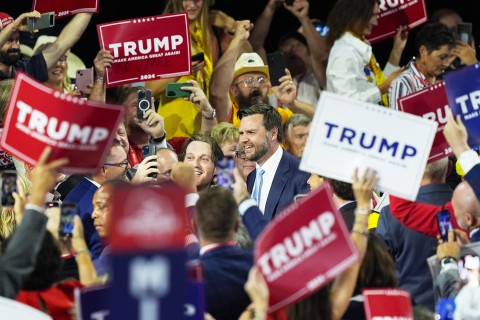Hawaii Democrat poised to be elected first Hindu in Congress
Hindu Americans have run America's major companies and universities, won Nobel prizes and Olympic gold medals, directed blockbuster movies, and even flown into space. But one profession has so far been out of reach: Member of Congress.
That may change next week in Hawaii's 2nd congressional district, where Democrat Tulsi Gabbard is poised to win an out-of-nowhere bid over Republican opponent Kawika Crowley. Gabbard was leading Crowley 70 percent to 18 percent, according to an Oct. 12 poll by the Honolulu Civil Beat.
The heavily Democratic district also elected one of two Buddhists to have ever served in Congress, Mazie Hirono, who won her seat in 2006 but is now running for the U.S. Senate.
Gabbard, 31, was born in American Samoa to a Catholic father and a Hindu mother, and moved to Hawaii when she was 2. In 2002, at age 21, she was elected to the Hawaii state legislature.
The next year, she joined the Hawaii National Guard, and in 2004 was deployed to Baghdad as a medical operations specialist. After completing officers' training she deployed to Kuwait in 2008 to train the country's counter-terrorism units.
Not everyone would welcome a Hindu into Congress. When self-proclaimed "Hindu statesman" Rajan Zed was asked to open the Senate with a prayer in 2007, the American Family Association called the prayer "gross idolatry" and urged members to protest; three protesters from the fundamentalist group Operation Save America interrupted the prayer with shouts from the gallery.
Then-Rep. Bill Sali, R-Idaho, said the prayer and Congress' first Muslim member "are not what was envisioned by the Founding Fathers." Former presidential candidate Rick Santorum told supporters this summer that equality was a uniquely Judeo-Christian concept that "doesn't come from the East and Eastern religions." Crowley, in an interview with CNN.com, said Gabbard's faith was incompatible with the Constitution.
Gabbard and her fellow Hindus obviously disagree.
"It is stunning that some people in Congress would so arrogantly thumb their nose at the Bill of Rights," Gabbard said in an email. "When I volunteered to put my life on the line in defense of our country, no one asked me what my religion was."
Had America's Founding Fathers "wanted to found a Christian nation, they would have said as much, but instead they founded it on the principle of religious freedom," said Mihir Meghani, a co-founder of the Washington-based Hindu American Foundation.
Gabbard, whose first name refers to a tree sacred to Hindus, fully embraced Hinduism as a teenager, and follows the Vaishnava branch that believes in the Supreme Lord Vishnu, and his 10 primary incarnations. Her primary scripture is the centuries-old Bhagavad Gita, whose themes include selfless action, spirituality, war, and serving God and humanity.
"The Bhagavad Gita is often considered a guide as to how to make decisions in difficult situations, when the decision is often not clear cut," Meghani said. "Hinduism's innate pluralism recognizes that there are various ways to look at things, and its focus on dharma, or duty, guides those holding positions of power or authority."
Among Gabbard's favorite verses, she said:
- "That which pervades the entire body you should know to be indestructible. No one is able to destroy that imperishable soul." (2:17)
- "The soul can never be cut into pieces by any weapon, nor can he be burned by fire, nor moistened by water, nor withered by the wind." (2.23)
Her faith, Gabbard said, helped her through Iraq, where there were daily reminders that she could be killed any time.
"First thing in the morning and the last thing at night, I meditated upon the fact that my essence was spirit, not matter, that I was not my physical body, and that I didn't need to worry about death because I knew that I would continue to exist and I knew that I would be going to God," she said.
Gabbard said her faith would be an asset in Congress, where she hopes to work on veterans' affairs, environmental issues, and developing relations with India, the world's largest democracy and a growing economic and nuclear power.
"It is clear that there needs to be a closer working relationship between the United States and India. How can we have a close relationship if decision-makers in Washington know very little, if anything, about the religious beliefs, values, and practices of India's 800 million Hindus?" said Gabbard.
"Hopefully the presence in Congress of an American who happens to be Hindu will increase America's understanding of India as well as India's understanding of America."
The two highest-profile Indian-American politicians are both Republicans and converts to Christianity: Louisiana Gov. Bobby Jindal was raised Hindu, while South Carolina Gov. Nikki Haley was raised Sikh.
While Gabbard has welcomed Indian-American support, her campaign noted that their contributions account for less than 3 percent of the total it has raised.
Still, her potential election has electrified the Hindu American community, which is estimated to be from 600,000 to 2.3 million, most of them Indian-Americans. Vijay Pallod, who hosted a fundraiser for Gabbard in his Houston home last Sunday (Oct. 28), is one of them.
"She will be good role model for second-generation Hindus," he said. "I am looking forward to see her taking oath under the Bhagavad Gita in January." —RNS





